To green wash your Los Angeles home effectively, start with eco-friendly detergents that break down easily and have certifications like the EPA's Safer Choice label. Minimize water usage by fixing leaks and using low-flow fixtures. Implement water recovery systems like rain barrels to collect water for irrigation. Avoid harmful chemicals in cleaning products and opt for biodegradable brands. Consider solar power options to reduce electricity costs and increase your home's value. Finally, educate yourself and others on sustainable practices. These tips can make a significant environmental impact while enhancing your home's appeal and functionality. There's even more to explore!
Choose Eco-Friendly Detergents
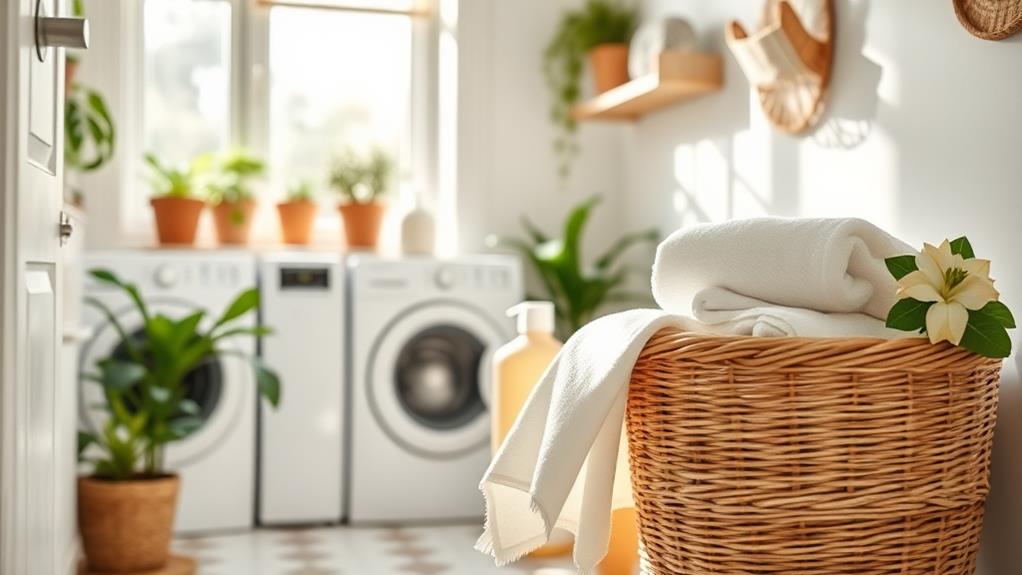
When it comes to cleaning your home, choosing eco-friendly detergents can make a significant difference. These products are designed to be safe for you, your family, and the environment.
Unlike conventional cleaners, eco-friendly detergents often use natural ingredients that break down easily, reducing pollution in our waterways.
When you shop for these products, look for certifications like the EPA's Safer Choice label or biodegradable packaging. These indicators show that the detergent meets strict environmental standards.
You'll find that many eco-friendly options work just as effectively as traditional cleaners, so you won't have to compromise on cleanliness.
Consider making your own detergents using simple ingredients like vinegar, baking soda, or castile soap. This not only cuts down on packaging waste but can also save you money in the long run.
Plus, you can customize the scents and effectiveness based on your preferences.
Switching to eco-friendly detergents helps create a healthier home environment. It's a small change that can lead to big benefits for you and the planet.
Minimize Water Usage
Minimizing water usage not only conserves an essential resource but also lowers your utility bills. You can start by fixing leaks in your home, as even a small drip can waste gallons of water each day.
Check faucets, showerheads, and toilets regularly for any signs of leakage.
When you do laundry or dishes, run full loads instead of partial ones. This simple change can notably reduce the amount of water you use.
Also, consider using the eco-friendly settings on your appliances, which often use less water and energy.
In the bathroom, take shorter showers and turn off the tap while brushing your teeth. This practice can save a surprising amount of water over time.
Installing low-flow showerheads and faucets is another effective way to reduce water consumption without sacrificing comfort.
If you have a garden, opt for drought-resistant plants that require less water to thrive.
Water your plants in the early morning or late evening to minimize evaporation.
By implementing these strategies, you'll contribute to water conservation efforts and enjoy the benefits of lower bills.
Use Low-Pressure Techniques
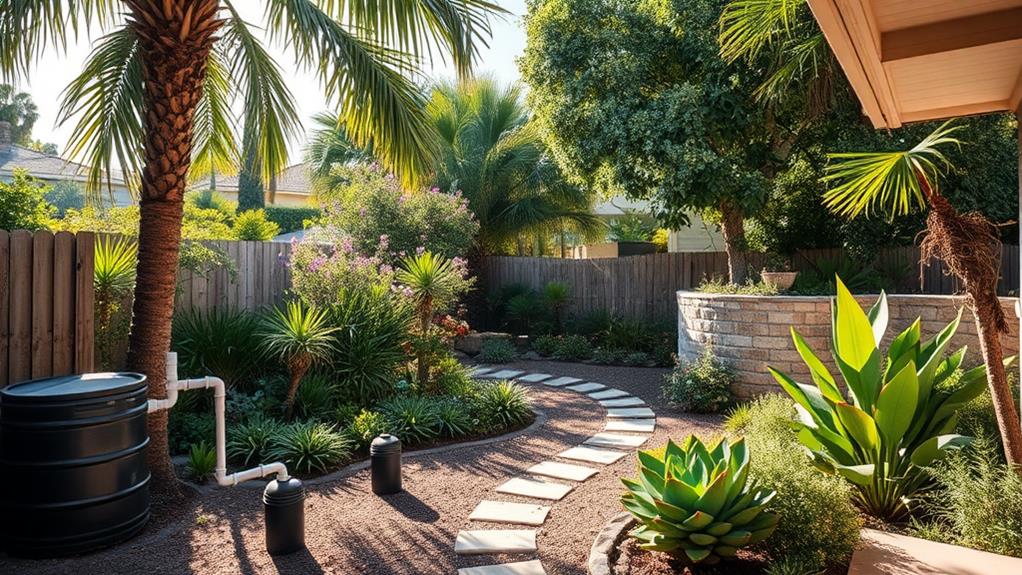
Incorporating low-pressure techniques into your gardening and landscaping can greatly reduce water usage while still keeping your outdoor spaces vibrant. One effective method is using drip irrigation systems. Unlike traditional sprinklers, these systems deliver water directly to the roots of your plants, minimizing evaporation and runoff. You can easily control the amount of water each plant receives, ensuring they thrive without wasting resources.
Another great option is soaker hoses. These hoses slowly release water along their length, providing moisture directly to the soil. You can lay them out in your garden beds or around trees, allowing for deep watering without the need for high pressure.
Additionally, consider installing rain barrels to collect and store rainwater from your roof. This water can be used later for irrigation, reducing your reliance on municipal water sources.
When watering your garden, be mindful of the pressure settings on your hose or sprinkler system, as lower pressure often leads to more efficient watering.
Select the Right Time
Choosing the right time for watering can greatly enhance your water conservation efforts. Watering early in the morning or late in the evening is ideal. During these cooler times, less water evaporates, allowing your plants to absorb more moisture.
If you water during the hottest part of the day, you'll waste a significant amount of water due to evaporation, which can leave your plants thirsty.
It's also important to take into account weather conditions. If rain is in the forecast, skip your scheduled watering. Checking the local weather can save you both water and money.
Additionally, if your soil feels damp an inch below the surface, it's a sign that your plants don't need more water right now.
Implement Water Recovery Systems
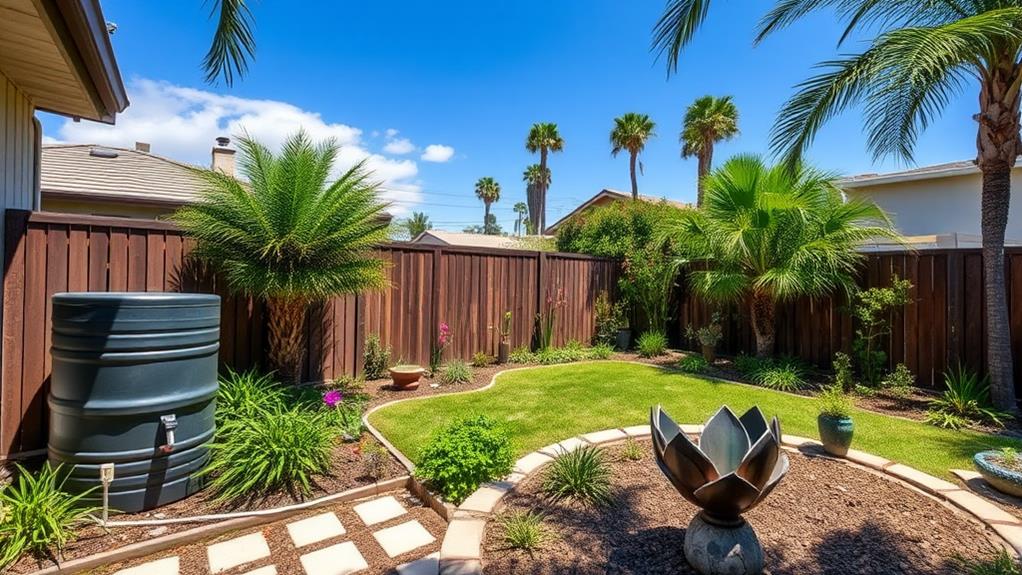
Implementing water recovery systems in your home can considerably reduce water waste and lower your bills.
You'll want to evaluate the types of systems available, like rainwater harvesting or gray water recycling, and how they fit into your space.
Additionally, regular maintenance is key to keeping these systems running efficiently and effectively, so it's important to plan for that, too.
Types of Water Systems
Many homeowners in Los Angeles are exploring various water systems to enhance sustainability and efficiency. A popular choice is rainwater harvesting, which collects and stores rainwater for later use in irrigation or non-potable applications. By using this system, you can reduce your reliance on municipal water and decrease water bills.
Another option is greywater systems, which recycle water from sinks, showers, and washing machines. This water is treated and reused for irrigation or toilet flushing. Implementing greywater systems can greatly lower your water consumption while still maintaining a lush garden.
You might also consider a rain garden, a planted depression that allows rainwater runoff to soak into the ground. Rain gardens help manage stormwater and improve local water quality by filtering pollutants through soil and plants.
Installation Considerations
When considering water recovery systems for your Los Angeles home, you'll want to think about several key installation factors.
First, assess the space available for your system. Some systems, like rainwater harvesting tanks, require significant outdoor space.
Next, check local regulations and permits, as some areas may have specific guidelines on water recovery systems. Understanding these rules will save you time and potential fines.
Additionally, consider the type of system that best fits your needs and lifestyle. Here are some important installation factors to keep in mind:
- Location: Choose a spot that's convenient and allows for proper drainage.
- Connection to Existing Systems: Verify your water recovery system can easily connect to your home's plumbing or irrigation systems.
- Maintenance Access: Plan for easy access to your system for regular checks and repairs.
Maintenance Best Practices
How can you guarantee your water recovery system operates efficiently and lasts for years?
First, regular maintenance is key. Check your system at least once a month for any signs of leaks or blockages, as these can reduce efficiency. Make certain to clean filters and screens to prevent buildup that can hinder water flow.
Next, inspect the pipes and connections regularly. Look for any wear and tear, and replace parts as needed to avoid major issues down the line.
It's also smart to monitor your water levels and usage. If you notice any sudden changes, investigate to find potential problems early.
Additionally, consider seasonal maintenance. During heavy rains, guarantee your system can handle increased water flow without overflow. In dry seasons, test your system more frequently to ensure it functions properly when you need it most.
Lastly, keep a maintenance log. Documenting your checks and repairs can help you track the system's performance over time.
Opt for Biodegradable Cleaners
When you choose biodegradable cleaners, you're not just making your home cleaner; you're also helping the environment by reducing harmful chemicals.
Popular brands like Seventh Generation and Method offer effective options that break down naturally, making them safer for you and your family.
Switching to these eco-friendly products is a simple yet impactful way to create a greener home.
Benefits of Biodegradable Cleaners
Using biodegradable cleaners in your home can markedly benefit both your health and the environment. When you choose these eco-friendly options, you're not just making a cleaner home; you're also contributing to a healthier planet.
Traditional cleaners often contain harsh chemicals that can irritate your skin and lungs. In contrast, biodegradable cleaners break down naturally, reducing pollution and minimizing your exposure to toxic substances.
Here are some of the key benefits of using biodegradable cleaners:
- Healthier Indoor Air Quality: Biodegradable cleaners reduce the number of harmful chemicals in your home, leading to fresher, cleaner air for you and your family.
- Safer for the Environment: These products decompose quickly, minimizing their impact on water systems and wildlife, ensuring you're not adding to pollution.
- Sustainable Ingredients: Many biodegradable cleaners use plant-based ingredients, which means you're supporting sustainable farming practices while cleaning your home.
Popular Biodegradable Brands
Choosing the right biodegradable cleaner can make a significant difference in your home's cleanliness and environmental impact. When you're shopping for these products, consider some popular brands known for their effectiveness and eco-friendly practices.
Seventh Generation is a well-known choice that offers a wide range of biodegradable cleaners, from all-purpose sprays to laundry detergents. Their products are made with plant-based ingredients, ensuring they're safe for both your family and the environment.
Another great option is Method, which not only provides biodegradable cleaners but also focuses on stylish packaging. Their fun scents make cleaning more enjoyable!
If you prefer something more natural, look into Mrs. Meyer's Clean Day. Their products are made with essential oils and are biodegradable, making them gentle on surfaces and tough on grime.
Avoid Harmful Chemicals
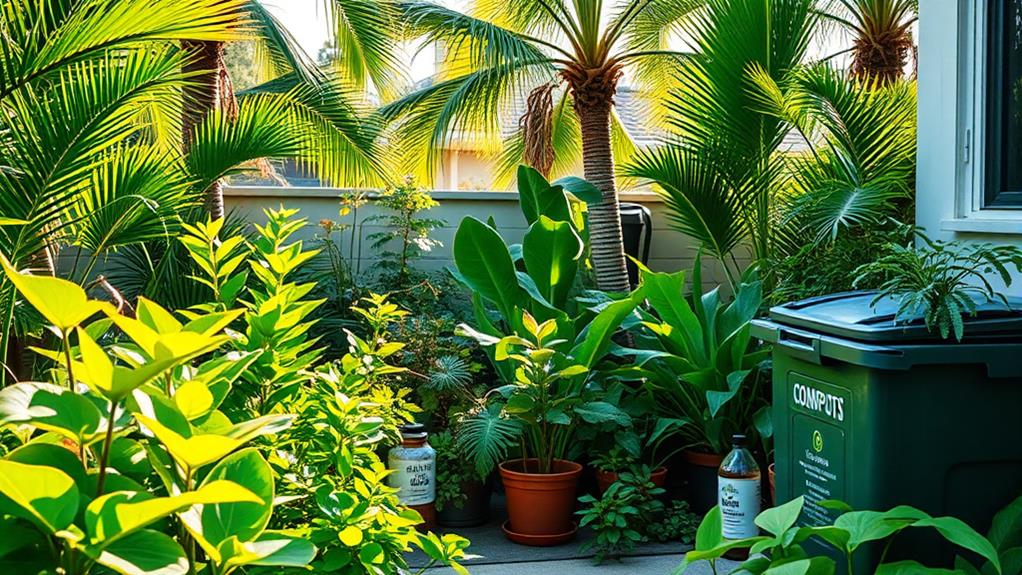
Many homeowners in Los Angeles are unaware of the harmful chemicals lurking in everyday cleaning products, paints, and pesticides.
These substances can't only harm your health but also negatively impact the environment. It's crucial to make conscious choices about what you bring into your home.
Here are a few tips to help you avoid harmful chemicals:
- Choose Natural Cleaning Products: Look for eco-friendly brands that use plant-based ingredients. These products are effective and reduce indoor air pollution.
- Opt for Non-Toxic Paints: When painting your home, select low or zero-VOC (volatile organic compounds) paints. They're safer for you and the air you breathe.
- Use Organic Pest Control: Instead of chemical pesticides, consider organic alternatives. They can effectively keep pests away without introducing toxic substances into your home.
Consider Electric Pressure Washers
Cleaning your home can be a revitalizing experience, especially when you consider the benefits of electric pressure washers. These machines use electricity instead of gas, making them a more eco-friendly choice. They produce fewer emissions and are quieter than their gas-powered counterparts, which means you can clean without disturbing your neighbors or the environment.
Additionally, utilizing professional pressure washing services can guarantee superior results and help maintain your home's exterior.
Using an electric pressure washer is easy and effective for tackling tough grime on your driveway, patio, and home exterior. The high-pressure water stream blasts away dirt, mold, and mildew, leaving surfaces clean and fresh. Plus, you won't need to rely on harmful chemicals, as the power of water alone often does the job well.
Another advantage is that electric pressure washers are generally lighter and easier to maneuver than gas models. You can connect them to a standard outlet, and they're ready to go.
Just make sure to follow safety guidelines and use the appropriate nozzle for the surface you're cleaning.
Focus on Solar Power Options
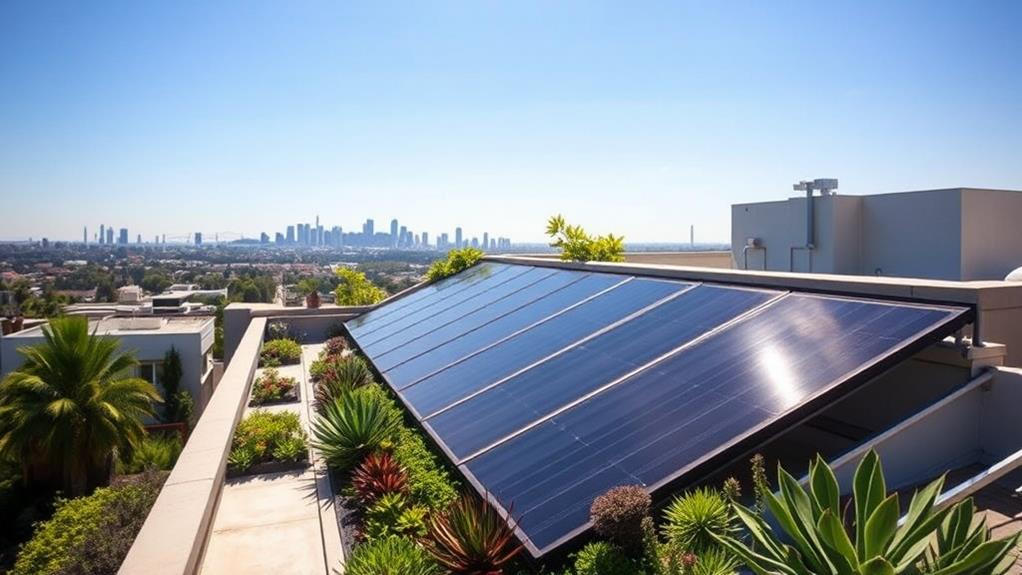
When considering solar power options for your home, you'll discover numerous benefits that can save you money and reduce your carbon footprint.
It's crucial to choose the right system that fits your energy needs, and exploring local incentives and rebates can make the investment even more appealing.
Benefits of Solar Energy
There's no denying the growing appeal of solar energy for homeowners in Los Angeles. As you consider solar power options, you'll find several benefits that can make a significant impact on both your home and the environment.
First and foremost, solar energy can reduce your electricity bills. By harnessing the sun's power, you can generate your own electricity, often leading to substantial savings over time.
Additionally, using solar energy can increase your home's value. Many buyers are attracted to homes with solar systems, viewing them as a modern and eco-friendly choice.
Finally, solar energy contributes to a healthier planet. By reducing reliance on fossil fuels, you help decrease greenhouse gas emissions, which is essential for combating climate change.
Here are some key benefits of solar energy:
- Cost Savings: Lower monthly utility bills and potential tax incentives.
- Increased Home Value: Attractive to future buyers and may boost property value.
- Environmental Impact: Reduced carbon footprint and support for clean energy sources.
With these advantages, solar energy isn't just a trendy choice; it's a smart and sustainable investment for your home.
Choosing the Right System
With the benefits of solar energy in mind, selecting the right solar power system for your home in Los Angeles can feel overwhelming.
First, consider your energy needs. Look at your past electricity bills to understand how much energy you consume monthly. This will help you determine the size of the solar system you'll need.
Next, think about the type of solar panels available. Monocrystalline panels are more efficient and take up less space, while polycrystalline panels are generally less expensive but occupy more area.
You'll want to weigh efficiency against cost to find what works best for your budget and roof space.
Don't forget about inverters, which convert the solar energy into usable electricity. String inverters are common but may not be the best if you have shaded areas.
Microinverters or power optimizers can help maximize your energy output.
Local Incentives and Rebates
As you explore solar power options for your Los Angeles home, you'll be pleased to discover a variety of local incentives and rebates that can greatly reduce your installation costs.
These programs are designed to help you make the switch to solar energy more affordable and accessible. By taking advantage of these opportunities, you can save money while contributing to a more sustainable environment.
Here are some key incentives to take into account:
- Federal Investment Tax Credit (ITC): You can claim a percentage of your solar installation costs on your federal taxes, considerably lowering your overall expenses.
- California Solar Initiative (CSI): This program offers cash rebates based on the size of your solar system, helping to offset the upfront costs of installation.
- Los Angeles Department of Water and Power (LADWP) Incentives: LADWP provides additional rebates for residential solar systems, making it even more beneficial to go solar in the city.
Educate on Eco-Friendly Practices
To truly embrace eco-friendly practices in your Los Angeles home, start by understanding the impact of your daily choices. Each decision you make—from the products you buy to the energy you use—plays a role in the environment.
For instance, consider switching to energy-efficient appliances. They not only reduce electricity consumption but also lower your utility bills.
Next, focus on reducing waste. Opt for reusable bags, bottles, and containers instead of single-use plastics. This simple change can greatly cut down on the trash you generate.
Also, composting food scraps is an excellent way to minimize waste while enriching your garden soil.
Educating yourself about local plant life can lead to a more sustainable landscape. Native plants require less water and maintenance, making them a smart choice for your garden.
Lastly, stay informed about eco-friendly products. Look for items labeled as biodegradable or ethically sourced.
Conclusion
By following these ten eco-friendly tips, you can make your Los Angeles home more sustainable. Did you know that using energy-efficient appliances can reduce your electricity bill by up to 30%? This not only saves you money but also helps the environment. From choosing the right detergents to implementing solar power options, each small change adds up. Remember, every effort counts in creating a cleaner, greener community for everyone. Let's work together for a brighter, eco-friendly future!

